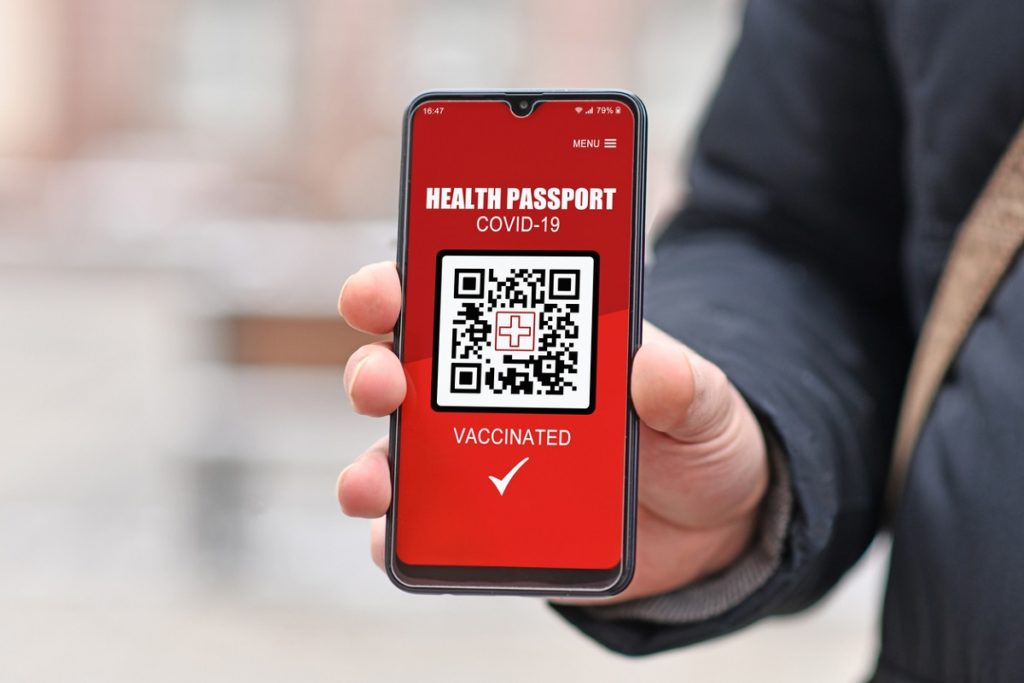As the UK and other countries around the world grapple with the ethics and practicality of various types of ‘vaccine passports’ as a potential route back to ‘normal’, many are asking whether the British public will really accept privacy becoming a casualty of freedom.
Last week, the government published a paper outlining a “roadmap out of the restrictions in place across England”, which includes a review on what Downing Street is calling a “Covid Status Certification” (translation: vaccine passport) could potentially consist of.


According to the paper, the ultimate goal of the certification scheme would be to “reopen [the] economy, reduce restrictions on social contact and improve safety.”
The hope is that with the certifications, people will be able to start going to “theatres, nightclubs, and mass events such as festivals or sports events.” Eventually, the certifications would potentially play a role in opening up the possibility for non-essential international travel.
It won’t have escaped the attention of Downing Street that the already once-postponed European Football Championship is due to take place in June, with all that entails.
Boris Johnson, in comments made during a visit to Cornwall, stopped short of calling the proposed scheme a ‘vaccine passport’, but did indicate that the government will “look at the possibility of making sure that we can continue to open up all sectors of the economy in a safe way down the rest of this year and, you know, we will look at all possibilities.”
The plan, essentially, would be to integrate the Covid Status Certification into the existing NHS App (not the contact tracing app), and allow people to demonstrate whether they have been fully vaccinated, recently recovered from Covid, or recently tested negative for the virus.
There are fears, however, that once such a solution is in place the government could potentially extend the reach of the certification scheme for other purposes well beyond the scope and timeline of the pandemic.
Those fears would not be unfounded, considering the government wants to hold onto NHS test and trace data for 20 years.
It’s a slippery slope that could have the potential to turn the UK into a checkpoint state where only those who prove themselves vaccinated or ‘healthy’ may participate in society.
Over in Europe, the European Commission is working on developing a Digital Green Certificate that would work in essentially the same way.
At least though, the European Commission has explicitly declared that its certificate scheme will be a temporary measure that is sunsetted once the World Health Organization officially “declares the end of the COVID-19 international health emergency.”
Under EU data protection laws, any data collected for a specified purpose must not be reused in any way that may be incompatible with the originally intended purpose, limiting the potential for any form of mission creep.
Across the pond, the US has resolved not to go forward with any type of federal vaccination passport scheme and is instead leaving it up to individual states and private institutions.
White House press secretary Jen Psaki stated that “The government is not now, nor will be, supporting a system that requires Americans to carry a credential. Our interest is very simple from the federal government, which is Americans’ privacy and rights should be protected, and so that these systems are not used against people unfairly.”
Some state governments, like New York for example, are planning on going forward with some version of a vaccination passport scheme, while other like Texas have roundly rejected the idea.
Texas Governor Greg Abbott, in announcing his executive order prohibiting government-mandated vaccine passports said: “Government should not require any Texan to show proof of vaccination and reveal private health information just to go about their daily lives.
“We will continue to vaccinate more Texans and protect public health and we will do so without treading on Texans’ personal freedoms.”
Back in the UK, the question remains, should we trust the government to handle this properly and to adequately protect our privacy?
Should the public feel safe providing their sensitive personal health data in exchange for the opportunity to go on holiday, to attend a festival, or even simply grab a pint at the pub?
A pandemic-weary public may indeed be willing to make that bargain. However, we should be wary of handing a frequently incompetent government the jurisdiction to throw together a vaccine certification scheme that doesn’t do enough to protect citizens’ privacy, isn’t fully transparent about the data to be collected, or how exactly the scheme would work in practice.
We also deserve assurances that the technology won’t be recycled for other purposes outside the scope of the pandemic.
With so many uncertainties, perhaps Downing Street should focus more on vaccination efforts rather than potentially compromising people’s sensitive health data or requiring them to prove they are safe to participate in society post-pandemic.









